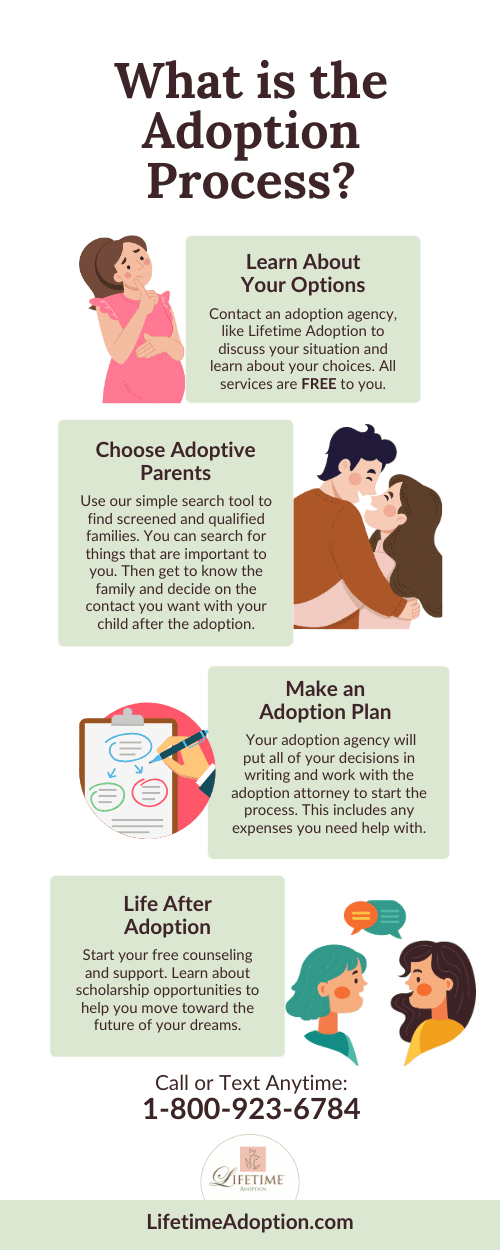
Adoption papers can be difficult to understand and take time to complete, but when you work with Lifetime, you will always have the help and support you need to complete them. As you plan your child’s adoption, some of your adoption paperwork will be legal documentation for your state, while other adoption papers will be held by Lifetime for records in case you need to pull information about your adoption in the future.
Don’t worry: you don’t have to tackle adoption papers alone. Lifetime Adoption will always be here to help you through any confusing parts of adoption paperwork and during your entire adoption process. If you’d like to speak with one of our Adoption Coordinators today, call or text 1-800-923-6784 anytime.
Here are some answers to the important questions you may have about the legal adoption process, including:
- What are the steps of the adoption process?
- Do birth parents have any rights in an open adoption?
- How do I complete adoption papers?
- Why are adoption papers important?
- How long after adoption can the birth mother change her mind?
Steps of the Adoption Legal Process
The process begins with you contacting Lifetime Adoption to discuss your situation and learn about your choices. All services are FREE to you. At Lifetime Adoption, you have the power to shape your adoption plan. You decide on:
- Choosing your baby’s adoptive parents.
- Determining the level of contact you want after the adoption.
- Planning how things will unfold during delivery.
- Deciding if you need financial assistance.
- Seeking support for your educational or career aspirations.
- Selecting who will be involved in the adoption planning.
If you’re not ready to make these choices now, that’s OK! We’re here to guide you through each decision whenever you’re ready, presenting all your options throughout the adoption process.

Lifetime Adoption Agency will put all your decisions in writing and work with the adoption attorney to start the adoption legal process, including any expenses you need help with.
You’re in control throughout the adoption process, including your time in the hospital when you’re delivering your baby. You can choose who accompanies you, decide how much time you spend with your baby, and determine the role the adoptive family plays. The adoptive parents you’ve selected will come to your city once you go into labor. They’ll be present if you’ve arranged for them to be there when you deliver. You have the right to spend as much time with your baby as you desire after the birth.
Typically, within the next day or two, you’ll meet with an attorney who will provide you with the legal documents for the adoption. They’ll also explain your rights and guide you through the process. Before finalizing the paperwork, the adoption attorney will ensure you feel confident in your decision.
Your baby will leave the hospital with the family you’ve chosen. You won’t be responsible for caring for your baby from when you’re discharged until you sign the paperwork. The adoptive couple will remain in your town and are open to meeting if you want to spend more time with your baby.
Birth Parents Rights in an Open Adoption
Pregnant women have the right to create their own open adoption plan, which means they can choose the adoptive parents and decide if they want to stay in touch. At Lifetime, we make sure all expecting moms have these options. Even if you don’t want to pick the parents, we can find a family that matches what you’re looking for by asking about traits like race or location.
There’s no pressure for pregnant women to go through with adoption. Understanding that nothing you do or say during your pregnancy commits you to adoption is crucial. You can reach out to Lifetime Adoption at any point to explore your options, even if you’re uncertain about adoption.
When you make that call, you’ll receive free information and support to grasp the adoption process more clearly, empowering you to determine if it aligns with your wishes. If you do choose to pursue adoption, our specialists will guide you through initiating the process. We know it’s important for you to understand what adoption means for you and your baby before making a decision. At Lifetime, we respect your choice without any judgment.
You also have the right to a free attorney, paid for by the adoptive parents you choose. This lawyer will focus only on your needs and won’t represent the adoptive family. They’ll go through all the paperwork with you so you can ask questions in a safe, unbiased space. Before the court officially approves an adoption, the birth mother or birth father still has the legal rights to their child.
A birth mother’s rights in open adoption include visitations, which can take place as often as you like. You’ll arrange and agree upon this with the adoptive parents you select. Birth mothers sometimes choose to draft a Post Adoption Contract Agreement (PACA). If allowed by your state law, your attorney can help you create a PACA and file it with the legal adoption papers. A PACA sets the expectation for future communication between you and the adoptive parents.
If you want to learn more, ChildWelfare.gov has a detailed report called “Consent to Adoption” with information about adoption laws in each state. There are also online resources like State Statutes Search and State Laws on Domestic Adoption. But don’t worry if it seems overwhelming — we and your lawyer will explain your rights as a birth mother as we go through the adoption process. Adoption can be complicated, but with Lifetime’s support, it can be easier!
How Do I Complete Adoption Papers?
At Lifetime, you will have a dedicated Adoption Specialist who can help you complete your adoption forms. Here is a guide to the types of adoption papers you will likely complete during your child’s adoption.
Initial Adoption Paperwork
When you contact Lifetime, the first step is to work on our online questionnaire. This form asks for information about what you want in your child’s adoption. In it, we ask important questions about you and your baby, such as what state you live in, what you’re looking for in adoptive parents, and when your baby is due. This initial adoption paperwork can include everything about when, where, and how you want your adoption process to move forward.
If you’re making an adoption plan for your child who is already born, we will ask that you complete our online questionnaire for placing a child for adoption. This questionnaire asks about things like your child’s medical history, education, and favorite things.
You can access these online adoption questionnaires at any time. They are not the final adoption papers you will sign but for gathering information about you and your situation.
As such, the questionnaire isn’t legally binding; completing it doesn’t mean you must go forward with an adoption. Instead, your answers help us provide you with information on hopeful adoptive parents who are ready and approved to adopt your child. Everything you tell us about yourself and your adoption is confidential and private.
Your Social History
Our online adoption questionnaire will include questions about your background, social history, and daily life. The information you share will help your Adoption Coordinator get to know you and gather information about your pregnancy. Here are examples of the social history questions that will be asked:
- Where do you currently live?
- How many pregnancies have you had?
- Do you currently work?
- What is your highest level of education?
- What is your race?
- Are you married?
- Do you have other children?
- Do you smoke?
- Do you drink alcohol?
Your Medical History
Lifetime requests that you share your medical history so that the adoptive parents you choose can provide the best care possible to your child. Sharing your medical history will also benefit your baby in the future. They will be able to provide their family’s medical history when asked at the doctor’s office.
Some examples of the medical conditions you’ll share on your adoption questionnaire include:
- Heart disease
- Diabetes
- Cancer
- High cholesterol
- Asthma
- Depression
- High blood pressure
- Anxiety
If you don’t know all the answers to questions about your medical history, that’s OK. You can consent to share information about any significant medical treatment or diagnoses you’ve had with Lifetime, and we’ll update your medical history in your adoption paperwork.
Information for Your Child
As your child grows up, they might start to wonder about you and ask questions about you. If you decide not to have an open adoption, the answers you provide on our questionnaire can provide your child with information about your interests, talents, appearance, and medical and genetic history. For these reasons, we ask that you answer all the questions fully.
Your Baby’s Father
Lifetime encourages birth fathers to be involved in the adoption planning process. We ask questions about him in our adoption questionnaire, too, such as his race, whether you live together, and if he knows you’re considering adoption.
If he’d like, he can give info about his health history, occupation, hobbies, and whether he has other kids. The answers he provides will allow your child to grow up with information on their birth father, too.
Here’s more information about your baby’s father and the adoption legal process:
How to Tell the Birth Father About Your Adoption Plan
Can a Birth Father Get Updates on His Child?
4 Ways the Birth Father Can Support Your Adoption
As a Birth Father, Do I Have a Say in the Adoption?
Why are adoption papers important?
At Lifetime Adoption, you’re in charge of your adoption plan. Your Adoption Specialist will work closely with you to understand all of your hopes for your baby’s adoption.
In order to do so, she’ll need to ask you lots of questions, such as what you’re looking for in an adoptive family, the type of contact you want to have with the family, how much contact you wish to share with your child, and how you’d like things to go during your hospital stay.
Information on your medical history is important because it allows us to learn what medical conditions you and your parents may have that could later affect your baby’s health. The adoptive parents you choose for your baby can be informed about your medical history so that theyre ready to get your child the medical care they need.
Your answers to the social history part of our online questionnaire are important for presenting you with compatible adoptive family profiles. When your Adoption Specialist suggests specific adoption profiles, she does this by matching your preferences and situation with families that could be perfect for your baby.
With Lifetime Adoption, you will always have our support in completing your adoption paperwork. For further assistance and free adoption information, you can call or text us today at 1-800-923-6784.
Final Adoption Papers
Adoption can only happen when you consent to terminate your parental rights to your child. The adoption papers you sign a few days after your baby is born are your legal consent to adoption.
Signing this paperwork means you willingly relinquish your parental rights to your child. Adoption is irreversible. The court will typically only decide to dismiss an adoption if it’s in the child’s best interest or if the child’s birth parents signed paperwork under coercion or duress.
However, Lifetime Adoption is not a law firm, so the information in this article doesn’t constitute legal advice. The information in this article is for general informational purposes only. No reader of this article should act or refrain from acting based on this information without first seeking legal advice from counsel. If you have personal questions about the legal process, please reach out to a local adoption attorney for answers.
Legally, How Long Does the Birth Mother Have to Change Her Mind?
Many women considering adoption experience times of doubt, wondering, “What if I change my mind?” Adoption involves matters of the heart, and sometimes a birth mother may change her mind before delivery, or her situation may shift, allowing for parenting. Maintaining open and honest communication with your adoption specialist about your feelings is crucial so they can offer you the most effective support.
Adoption laws vary in each state. In general, the birth mother has the right to change her mind and decide not to sign the legal papers transferring parental rights to the new family. All states allow a biological parent to change their mind after the child is born but before the court finalizes the process.
In most states, there’s a mandatory waiting period before a birth mother can complete the legal adoption process and sign the final paperwork. This period typically varies from 12 hours to several days after the birth. The waiting times exist to give you a chance to rest and feel better after having a baby, think carefully about your choice for adoption, and make sure any medications that could affect your decisions have worn off.
Typically, a few days after a birth mother delivers, she meets with an attorney who presents her with the legal paperwork for the adoption. The attorney also explains her rights and helps her understand the legal adoption process. Before completing the paperwork with the birth mother, the adoption attorney makes sure that she is well-informed and confident in her decision.
To sum it up, your adoption decision only becomes permanent if:
- Your baby has been born
- You sign the legal adoption paperwork, AND
- The revocation period is over
How Lifetime Adoption Helps with the Adoption Legal Process
If this all sounds intimidating, don’t worry. You have rights as a birth mother, and an adoption attorney will explain your rights and answer your questions about adoption law. This attorney will be provided for you at no cost to you.
Your adoption specialist will accompany you through every step of the adoption process, answering your questions and guiding you through any uncertainties you may face. Their support ensures you feel confident in making the best decision for both you and your baby, whether it’s adoption or parenting. Should you have any doubts, don’t hesitate to reach out to your specialist for a supportive conversation about your feelings.
Our adoption professionals will be available 24/7 to answer your questions, address your concerns, and assist you in crafting the plan that best suits you and your child. They want you to be comfortable with your decision, no matter what it is.
“I honestly thought it would just be about the baby, the adoptive parents and the agency and the birth mom would be somewhere in the background. But I was pleasantly surprised that they actually cared about me too. I would get snail mail like cards and little notes of encouragement…[She] would offer free counseling through a licensed professional or other birth mothers who were also in my position before,” Sarah said of her time working with her adoption specialist, Diane. “…they treat me like a person and I’m honestly deeply touched by their kindness before, during and after the process.”
You can call or text us today at 1-800-923-6784 to speak with an adoption professional or contact us online for free adoption information.
Editor’s Note: This article was originally published on August 10, 2018, and has since been updated.
As Vice President of Lifetime Adoption, Heather Featherston holds an MBA and is passionate about working with those facing adoption, pregnancy, and parenting issues. Heather has conducted training for birth parent advocates, spoken to professional groups, and has appeared on television and radio to discuss the multiple aspects of adoption. She has provided one-on-one support to women and hopeful adoptive parents working through adoption decisions.
Since 2002, she has been helping pregnant women and others in crisis to learn more about adoption. Heather also trains and speaks nationwide to pregnancy clinics to effectively meet the needs of women who want to explore adoption for their child. Today, she continues to address the concerns women have about adoption and supports the needs of women who choose adoption for their child.
As a published author of the book Called to Adoption, Featherston loves to see God’s hand at work every day as she helps children and families come together through adoption.






0 Comments